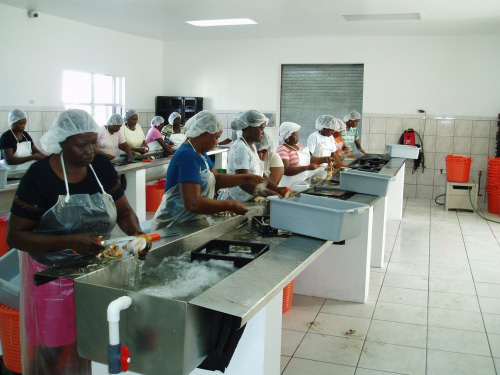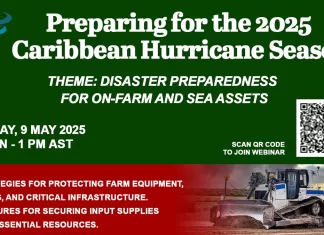EU works with the Caribbean Regional Fisheries Mechanism to help to make Caribbean fishery products safer.
A fisheries and aquaculture food safety capacity building activity, funded by the EU and delivered under the technical leadership of IICA and the CRFM, is helping CARIFORUM countries to improve the safety of fish and fishery products for consumers in national and export markets. The activity, which is part of a broader programme and which started in September 2016 and will run until January 2017, has prepared eight new manuals to help fish inspectors apply the best international practices to the inspection of fishing vessels, processing establishments and aquaculture facilities. The subjects covered include HACCP, traceability, and for the first time, a compendium of food safety hazards encountered in Caribbean fishery products. In addition, the project has prepared two manuals for laboratories, on the testing of fishery products to make sure they are safe, and ensuring that laboratory test results are accurate.
To help disseminate these new manuals, the project will also run two one-week courses for 30 participants from CARIFORUM countries, to be held in Saint Vincent and the Grenadines at the end of November. This will present the manuals, as well providing training in best international practices in fish inspection, and demonstrating some of the modern approaches to rapid and field testing to allow better decisions to be made about the safety of fishery products. The course will be attended by participants from Antigua and Barbuda, the Bahamas, Barbados, Belize, the Commonwealth of Dominica, the Dominican Republic, Grenada, Guyana, Jamaica, St. Kitts and Nevis, St Lucia, Suriname, Saint Vincent and the Grenadines and Trinidad and Tobago.
The fishery sector is important for many countries in the region, as a source of employment, and export revenues. Overall, in 2015, the CARIFORUM countries exported fish worth US$378 million to many countries around the world. Whilst 89% of this is from just five countries (Bahamas, Belize, Guyana, Suriname and Trinidad and Tobago) the fishery sector of many other countries in the region delivers supplies directly to their tourist sector. The continued economic importance of the fishery revenue therefore depends on making sure that fish meets international sanitary standards, and governments in the region are therefore very interested to ensure that typical food safety hazards such a ciguatera and histamine are under control.
The project “Capacity Building of regulatory and industry stakeholders in Aquaculture and Fisheries Health and Food Safety to meet the SPS requirements of international trade” is implemented by the Inter-American Institute for Cooperation in Agriculture (IICA). The objective of the project is “To build capacities of CARIFORUM States in health and food safety requirements of fisheries and aquaculture (inland, marine) products and as such ensure safe food standards for fisheries products in the region, while meeting the requirements of the region’s trading partners worldwide.”
In this task, IICA, is supported by the Caribbean Regional Fisheries Mechanism (CRFM) and, for the present training activity, also by a team of consultants from Megapesca in Portugal. The project is financed under the EU project “10th EDF Sanitary and Phytosanitary Measures Project”. The expected result of the current activity is that capacities will be strengthened at the national and regional levels for health and food safety requirements of fisheries and aquaculture (inland, marine) products which will also ensure safe food standards for fisheries products in the region, while meeting the requirements of the region’s trading partners worldwide.





